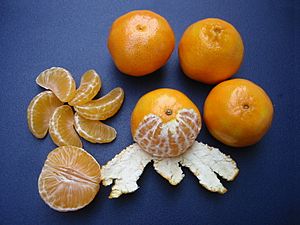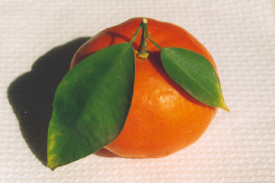Clementine facts for kids
A clementine (Citrus × clementina) is a hybrid between a mandarin orange and a sweet orange, so named in 1902. The exterior is a deep orange color with a smooth, glossy appearance. Clementines can be separated into 7 to 14 segments.
Similar to tangerines, they tend to be easy to peel. The clementine is also occasionally referred to as the Moroccan clementine. They are typically juicy and sweet, with less acid than oranges.
They are named after a French monk, Père Clément Rodier, who lived in North Africa at the beginning of the 20th century. He either found a natural mutation of the mandarin orange, which he grew, or he created a hybrid of the mandarin and the Seville oranges. The fruit, however, may have originated long before in Asia.
Contents
Cultivation
This variety was introduced into California commercial agriculture in 1914. Clementines lose their desirable seedless characteristic when they are cross-pollinated with other fruit. To prevent this, in 2006 growers in California threatened to sue local beekeepers to keep bees away from their crops.
Varieties
- Clemenules or Nules - A high-quality popular, seedless, easy to peel clementine with a very pleasing sweet flavor. A mutation of the Spanish Fina variety, Clemenules is the most widely planted clementine in Spain, where it is widely planted and matures from mid-November to mid to late-January. Also widely planted in California, where it matures from October to December.
- Nadorcott - A patented, late-season variety that is seedless when grown in isolation from all other citrus. Compared to the Clemenules or Nules variety, the Nadorcott is distinguished by its more red-orange color, thinner peel, and flavour that is decidedly less sweet and more tart and bitter than the Clemenules. The patent was filed in January 1997.
Images for kids
See also
 In Spanish: Clementina para niños
In Spanish: Clementina para niños






